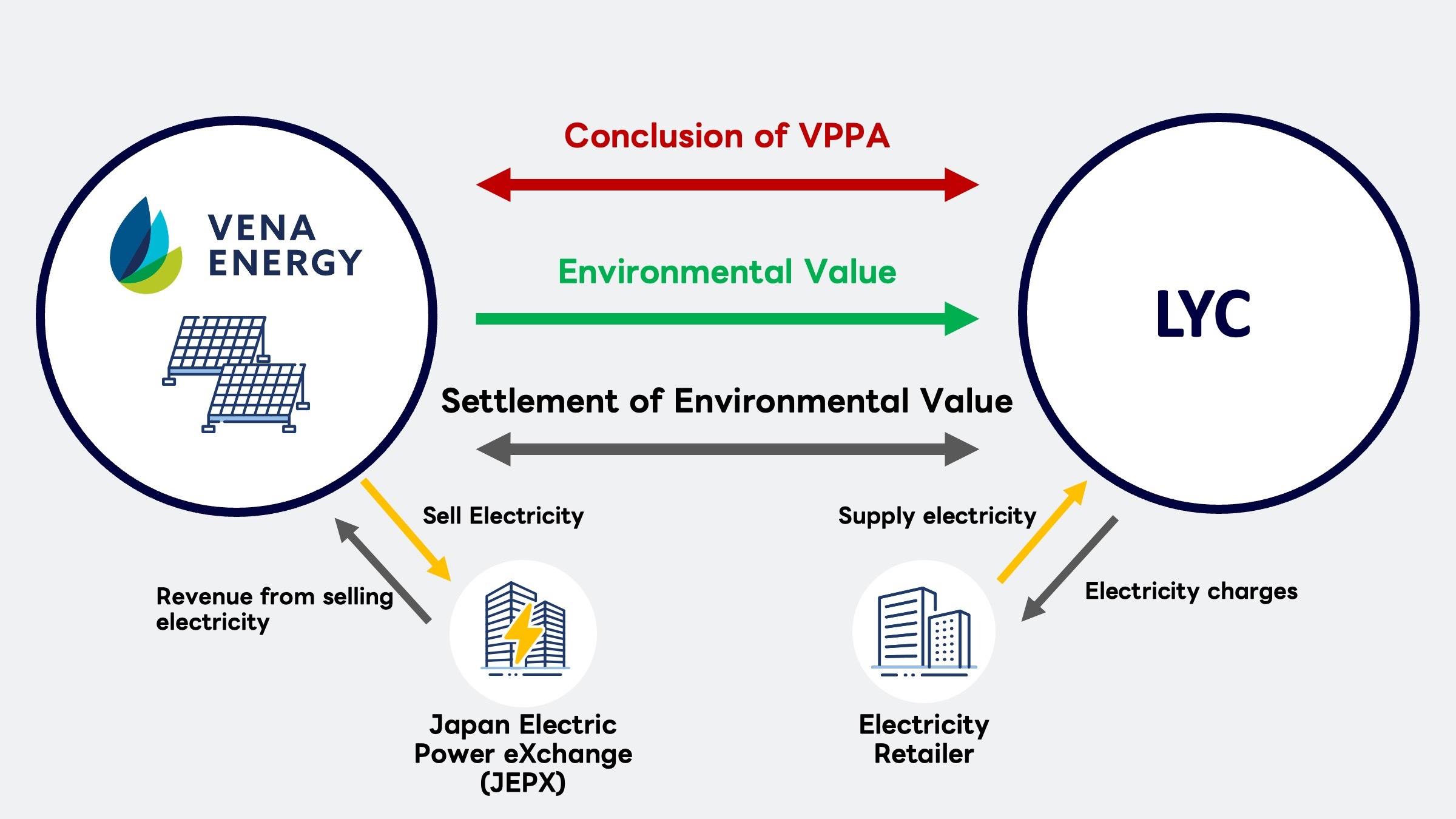LY Corporation Signs Its First PPA
LY Corporation will purchase environmental value of 85 GWh annually for 20 years from Maniwa Solar Project, Japan’s largest single-unit solar project for VPPAs. The purchase will avoid CO2 emissions by a total of approximately 740,000 tons.
LY Corporation ("LYC") has concluded a virtual power purchase agreement (an agreement in which a power consumer and a power producer directly trade only the environmental value according to the power generated; "VPPA") with Vena Energy, a renewable energy power producer, for the Maniwa Solar Project to be built in Maniwa City, Okayama Prefecture (construction scheduled to be completed in 2026). LYC will purchase environmental value (CO2 reduction effect) of 85 GWh annually for 20 years from the Maniwa Solar Project through non-FIT non-fossil certificates. Maniwa Solar Project is the largest single-unit solar power project for VPPAs in Japan,*1 and this is the first PPA signed by LYC.
A VPPA is a contract in which companies that consume electricity directly enter into an agreement with power producers to purchase the environmental value of renewable electricity. By purchasing the environmental value, LYC will be able to effectively claim a portion of its electricity usage as consumption of renewable energy. LYC expects this to avoid CO2 emissions by approximately 740,000 tons over 20 years (equivalent to the annual CO2 emissions of approximately 300,000 households*2).
LYC participates in the global initiative RE100, where companies commit to sourcing 100% of the electricity for their operations from renewable energy. LYC's goal is to achieve net-zero greenhouse gas emissions for Scope 1 and 2 within the LYC Group by fiscal year 2030, and to extend this to Scope 1, 2, and 3 by 2050.
Through this VPPA, LYC introduces a new renewable energy source with additionality*3 to its existing procurement methods, creating a genuine and stable procurement portfolio. With this, LYC aims to achieve carbon neutrality, while also contributing to the widespread adoption of renewable energy and the realization of a decarbonized society.

LYC focused on the following aspects when considering the VPPA with Vena Energy for the Maniwa Solar Project.
- Generation Capacity and Additionality
The Maniwa Solar Project, Japan's largest single-unit solar project for VPPAs, will generate 85 GWh annually. The 20-year contract ensures a stable procurement of environmental value for LYC. LYC also focused on additionality, driven by the belief that expanding renewable energy in Japan is essential for companies to transition to renewable sources. LYC has determined that this VPPA has additionality as it involves the construction of a new renewable energy facility that meets the "technical criteria" set by RE100 for participating companies. - Reduction of Environmental Impact
Considering the burden on the natural environment, the Maniwa Solar Project is being constructed on a former golf course, eliminating the need for new land development. From a biodiversity conservation perspective, the environment is appropriately protected in accordance with the Environmental Impact Assessment Act, ensuring consideration for local wildlife. - Regional Harmony and Co-benefits
Local employment is planned to be prioritized for hiring contractors and employees necessary for the construction and operation of the Maniwa Solar Project, creating jobs and contributing to regional development. In addition, local businesses and personnel were engaged in preparatory activities conducted before construction began, including water quality surveys and grass cutting. Further, a portion of the revenue from environmental value transactions is planned to be allocated as funding for community return initiatives, such as the donation of emergency power generation equipment to the local communities.
Outline of Maniwa Solar Plant
| Solar project name | Maniwa Solar Project(Location: Maniwa City, Okayama Prefecture) |
|---|---|
| Launch date | August 2026 (planned) |
| Installed capacity | 72MW (equipment capacity) |
LYC has established the Basic Policy on Sustainability, aiming to bring positive impact to society through its businesses and promote sustainability management that takes responsibility for future generations by addressing social issues, including the global environment and human rights. Among the six material issues identified is "fulfilling responsibilities for the global environment and future generations," which involves efforts to reduce the environmental impact of business activities, manage waste, conserve water resources, and preserve biodiversity. LYC also supports international environmental initiatives and promotes global environmental measures by setting medium- to long-term goals in cooperation with the international community.
LYC's mission is to "Create an amazing life platform that brings WOW! to our users." Under this mission statement, LYC will bring positive impact to society through its businesses and promote sustainability management that takes responsibility for future generations by addressing social issues, including the global environment and human rights.
*1 Based on research by DIGITAL GRID Corporation (as of December 2024).
*2 Reference: Estimated based on the survey by Japan's Ministry of the Environment "Survey on the Actual Conditions of Carbon Dioxide Emissions from Residential Sector in FY2024 (Preliminary Figures)" https://www.env.go.jp/content/000261322.pdf (Japanese only).
*3 Refers to the concept that procuring renewable electricity leads to construction of and investment in renewable energy facilities, resulting in the addition of renewable energy capacity to the grid.
About Vena Energy
Vena Energy has solar projects, wind farms (onshore/offshore), and energy storage system assets (stationary/portable) that are under development, construction, and operation, with a combined capacity of over 45 gigawatts. As of December 31, 2023, the company is headquartered in Singapore and has 86 offices in Japan, North Korea, Taiwan, Thailand, India, Australia, Indonesia, and the Philippines, employing 964 people.
Vena Energy Japan K.K., the Japanese subsidiary of Vena Energy, is headquartered in Minato-ku, Tokyo, and operates 17 domestic offices. In Japan, Nippon Renewable Energy K.K. is responsible for solar projects, Nippon Wind Energy K.K. for the onshore wind power business, Vena Energy Offshore Wind K.K. for offshore wind projects, NRE Operations K.K. for the power plant operation and management, and Vena Energy Engineering K.K. for the construction project management, including construction contracting.
Disclaimer:
Unless otherwise specified, English-language documents are prepared solely for the convenience of non-Japanese speakers. If there is any inconsistency between the English-language documents and the Japanese-language documents, the Japanese-language documents shall prevail.
Related Press Releases
-
 Press Release
Press ReleaseLY Corporation Achieves Sustainability Linked Loan Target Ahead of Schedule Donates Approx. JPY20 Million (Equivalent to Interest Rate Reduction) to Environmental Organizations
-
 Press Release
Press ReleaseMatch-Three Puzzle Game “LINE Match Flight” Launches Today!
-
 Press Release
Press ReleasePre-Registration Campaign Begins Today for a New Match-Three Puzzle Game from LINE GAME, “LINE Match Flight”
Latest Press Releases
-
 Press Release
Press ReleaseLY Corporation Achieves Sustainability Linked Loan Target Ahead of Schedule Donates Approx. JPY20 Million (Equivalent to Interest Rate Reduction) to Environmental Organizations
-
 Technology
TechnologyLY Corporation to Host Technology Conference, "Tech-Verse 2025"
-
 Press Release
Press ReleaseMatch-Three Puzzle Game “LINE Match Flight” Launches Today!


